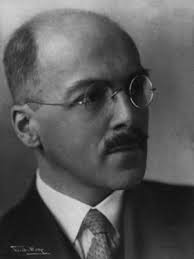| Profile | Major Works | Resources |
Eduard Heimann, 1889-1967.

German economist from Hamburg, and Christian Socialist.
Eduard Magnus Mortier Heimann was born in Berlin, Germany, to a prosperous family of Jewish descent. His father, Hugo Heimann, was a publisher and Social Democratic politician. After finishing high school in 1908, Eduard Heimann studied economics at Heidelberg, Vienna and Berlin, absorbing a variety of economic schools - Marxist, Neoclassical, Historicist - at each location. He obtained his doctorate under Alfred Weber.at Heidelberg, although he would later cite Franz Oppenheimer as his biggest influence. For medical reasons, Heeimann was exempted from military service during WWI, and worked instead in the private sector plants for a few years.
In 1919, Hemann was elected general secretary of the first socialization committee, that pushed for the nationalization of coal and steel, and also participated in the second committee of 1920. Returning to academia, he submitted his habilitation thesis at the University of Freiburg in 1922, and lectured there until 1925, when he was appointed to the University of Hamburg. Heimann continued to be an active public intellectual, participating in nationwide debates on social policy. It was already early in this period that Heimann grew dissatisfied with the materialism of Marxism, and was drawn into the Christian Socialist circle of Paul Tillich and Martin Buber. Heimann departed sufficiently from Marxian theory to provide it with a "idealistic" edge, almost to the extreme of Manchester School liberalism.
After the Nazis took power in 1933, Eduard Heimann was promptly dismissed from his post. Heimann emigrated to New York, joining "University in Exile" at the New School for Social Research, where he taught until 1958. His History of Economic Doctrines is a classic in the HET. Heimann eventually returned to Germany, and retired in Hamburg.
|
Major works of Eduard Heimann
|
|
HET
|
|
Resources on Eduard Heimann
|
All rights reserved, Gonšalo L. Fonseca
